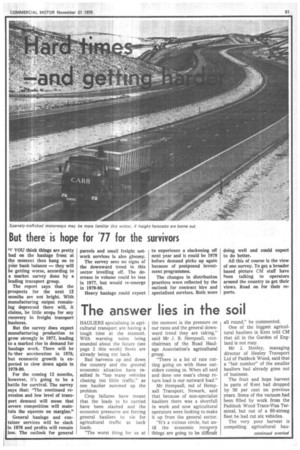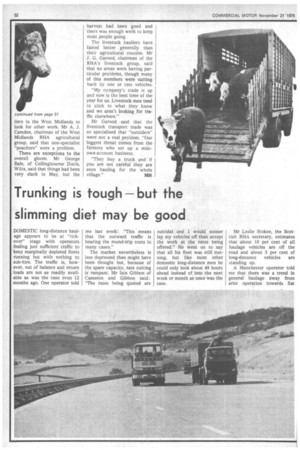The answer lies in the soil
Page 57

Page 58

If you've noticed an error in this article please click here to report it so we can fix it.
HAULIERS specialising in agricultural transport are having a tough time at the moment. With warning notes being sounded about the future (see page 2 this week) fleets are already being cut back.
Bad harvests up and down the country and the general economic situation have resulted in "too many vehicles chasing too little traffic," as one haulier summed up the problem.
Crop failures have meant that the loads to be carried have been slashed and the economic pressures are forcing general hauliers to vie for agricultural traffic as back loads.
"The worst thing for us at the moment is the pressure on our rates and the general downward trend they are taking," said Mr J. B. Hernpsall, vicechairman of the Road Haulage Association's agricultural group.
"There is a lot of rate cutting going on with these outsiders coming in. When all said and done one man's cheap return load is our outward load."
Mr Hempsall, md of Hempsall Transport, Newark, said that because of non-specialist hauliers there was a shortfall in work and now agricultural operators were looking to make it up from the general sector.
"It's a vicious circle, but until the ' economic recovery things are going to be difficult all round," he commented.
One of the biggest agricultural hauliers in Kent told CM that all in the Garden of England is not rosy.
Mr J. Henley, managing director of Henley Transport Ltd of Paddock Wood, said that a "fair number" of the smaller hauliers had already gone out of business.
The fruit and hops harvest in parts of Kent had dropped by 50 per cent on previous years. Some of the vacuum had been filled by work from the Paddock Wood Trans-Visa Terminal, but out of a 60-strong fleet he had cut six vehicles.
The very poor harvest is compelling agricultural hau Hers in the West Midlands to look for other work. Mr A. J. Camden, chairman of the West Midlands RHA agricultural group, said that non-specialist "poachers" were a problem.
There are exceptions to the overall gloom. Mr George Bale, of Collingbourne Ducis, Wilts, said that things had been very slack in May, but the harvest had been good and there was enough work to keep most people going.
The livestock hauliers have faired better generally than their agricultural cousins. Mr J. G. Garood, chairman of the RHA's livestock group, said that no areas were having particular problems, though many of this members were cutting back by one or two vehicles.
"My company's trade is up and now is the best time of the year for us. Livestock men tend to stick to what they know and we aren't looking for traffic elsewhere."
Mr Garood said that the livestock transport trade was so specialised that "outsiders" were not a real problem. "Our biggest threat comes from the farmers who set up a mini own-account business. , "They buy a truck and if you are not careful they are soon hauling for the whole village." MH








































































































